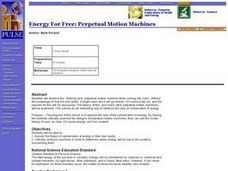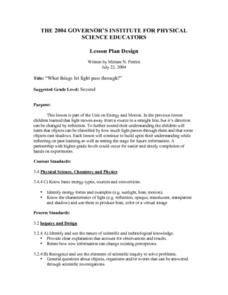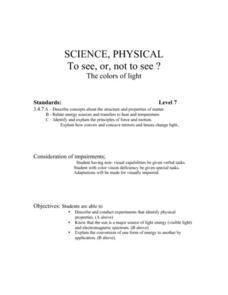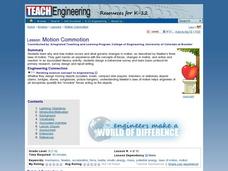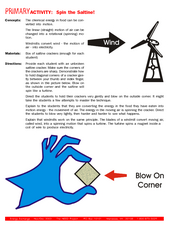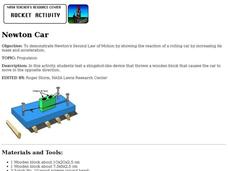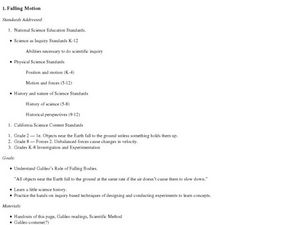Curated OER
Motion Through the Ages
Eighth graders conduct internet research to produce a timeline of man's growth in understanding of concepts of motion and planetary motion through history.
Curated OER
Energy for Free: Perpetual Motion Machines
Students observe the "drinking bird" perpetual motion machine and critically examine the designs of other so-called perpetual motion machines. They use this experience to create their own definition of conservation of energy.
It's About Time
Exploring Energy Resource Concepts
Please turn off the lights to conserve energy. Or not, after all energy is always conserved. This first lesson in an eight-part series includes three parts. Part A contains one hands-on activity and two inquiry-based experiments on heat...
Star Date
Modeling the Night Sky
Dramatize the stars and planets as they become a visual representation of the solar system in this activity. Young astronomers track and simulate various constellations as they orbit the Earth to learn the position and motion of...
Teach Engineering
Pushing it Off a Cliff
Focus on the conservation of energy, specifically looking at gravitational potential energy and kinetic energy, with a lecture that involves having friends throw light objects at each other to determine which has more kinetic energy and...
Curated OER
Bronx Cheer Bulb
If you chew or make a "raspberry" while viewing an LED light source, the light will appear to wiggle or flicker. It is not because of the light itself, but because of the vibration of your skull! Have your physics class give this a try...
Curated OER
What things let Light Pass Through?
Second graders classify objects according to how well light can pass through them and predict how well objects will transmit light. They experiment with objects to verify predictions while collecting, recording, and interpreting data...
Curated OER
Help Wanted: A Lighting Engineer For Popular Rock Group
Students are assigned to groups, and determine each member's role in the group. They will design an experiment to determine a way to produce the three primary and five secondary colors. Students discuss color and mood. They listen to a...
Curated OER
To See or Not to See: The Colors of Light
Seventh graders describe and conduct an experiment that identifies the physical properties of light. They explore sources of visible light and an electromagnetic spectrum. Students explain the conversion of one form of energy to another.
Curated OER
How Do The Colors of Light Mix?
Young scholars investigate the mixing of light. They form a hypotheses to reason why color changes occur and they write conclusions and ask new questions arising from the investigation. Students identify the primary and complementary...
Curated OER
Motion Commotion!
Students explore the drawings of Rube Goldberg to design and construct a simple machine. They discuss simple machines, and using various materials and toy parts, design and construct a "Rube Goldberg" style machine to ring a bell.
Curated OER
Pushes and Pulls
Students examine different types of movement and causes that may affect those movements. In this online interactive forces and motion lesson, students use toy cars to observe push and pull and then make predictions and collect data...
Curated OER
Spin the Saltine!
Students investigate chemical energy. In this physical science lesson, students blow on saltine crackers to demonstrate how chemical energy in food can be converted to motion. Students compare the saltine cracker experiment to how...
Curated OER
Thinking About Newton's 1st Law
Students discuss the lives of both Aristotle and Newton in order to bring important differences between the two to the forefront. They evaluate two statements about motion and use the ideas from the discussion to determine which...
Curated OER
Rocket Activity
Students explore Newton's Second Law of Motion. In this rocket activity lesson, students experiment with Newton's Second Law of Motion as they use a slingshot device to force a car to move.
Curated OER
Wave Action
In this waves worksheet, students compare the characteristics of sound and light waves and determine the wavelength, amplitude, and speed of a wave. This worksheet has 9 problems to solve.
Curated OER
The Dymaxion Car
In this motion worksheet, students read about the invention of the Dymaxion car that was designed to achieve high speeds. Students complete 2 short answer questions based on the reading.
Curated OER
How Wind Works
Second graders investigate the process that creates wind. In this wind lesson plan, 2nd graders create a wind diagram. Students write an essay to accompany their diagram.
Curated OER
Reflecting Light
Students are introduced to the reflective properties of light and use mirrors to make light from a source reflect onto a specific target. They take turns and record the amount of time it took to correctly reflect the light.
Curated OER
Light the Bulb
Students explore electricity. In this power experiment lesson, students determine what is required for lighting a bulb. Students develop an understanding of open and closed circuits, and how energy is formed
Curated OER
Motion Picture Analysis Worksheet
In this motion picture worksheet, learners analyze a motion picture and complete information for pre-viewing and then viewing the picture. Students also answer several post-viewing sections.
Curated OER
Simple Harmonic Motion
Students explain the theory of simple harmonic motion (SHM) by performing hands-on, practical application experiments.
Curated OER
Meet the Neighbors: Planets Around Nearby Stars
Students explain why a transiting planet causes a periodic dimming in the light from its parent star. They determine the radius of a planet, and its orbital distance, by analyzing data and manipulating equations. Students compare the...
Curated OER
Falling Motion
Students design and conduct an experiment on Galileo's Rule of Falling Bodies. In this physics lesson, students collect and analyze data. They create a presentation and share it with the class.



